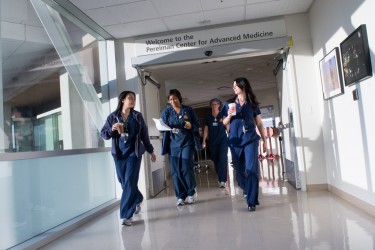Master of Science in Nursing (MSN)
Graduates from the MSN program at Penn Nursing are prepared to creatively combine knowledge and skills, with special attention given to clinical decision-making and management.
Nurse Practitioner ProgramsAcute Care APRN Track
Adult-Gerontology Acute Care Primary Care APRN Track
Adult-Gerontology Primary Care Nurse Practitioner*
|
Advanced Specialist ProgramsAdministration Programs |
*Eligible for the Leonard A. Lauder Community Care Nurse Practitioner Program Fellowship, which offers a free Penn education to budding NPs who are committed to working in underserved communities after graduation.
Outcomes
 At the completion of this advanced level of nursing education, Penn Nursing MSN graduates will:
At the completion of this advanced level of nursing education, Penn Nursing MSN graduates will:
- Use scientific inquiry to translate evidence into practice and promote clinical scholarship
- Perform advanced nursing skills for specialty and subspecialty nursing practice
- Lead quality improvement and manage care delivery models across settings
- Leverage strong networks to advance in professional role
These overarching outcomes for all MSN program/tracks reflect the American Association of Colleges of Nursing (AACN) Essentials.
A MSN advanced practice registered nurse (APRN) will integrate theoretical and clinical expertise to demonstrate mastery of specific population focused student learning outcomes. The student learning outcomes specific to advanced nursing education for practice specialties include:
- Formulating plans of care for population-specific diagnoses.
- Delivering educational and therapeutic interventions using advanced health assessment, pathophysiology, pharmacology, and genetics.
While program curricula prepare students to sit for national certification within their role and population area, APRN graduates may be required to complete additional state specific requirements before being permitted to practice.
Other Student Related Outcomes
A minimum of 12 course units are required for most of our MSN programs. Depending on the program, full-time students will take between one and three full calendar years to complete their course of study. A maximum of five (5) calendar years, beginning with the initial graduate course following matriculation, is allowed for completion of the work for the MSN degree.
MSN Minors
Designed to supplement and enrich our MSN programs, we offer multiple minors for those who want to more deeply engage with their chosen field.
How to apply
For details on our application process, see the Admissions section.